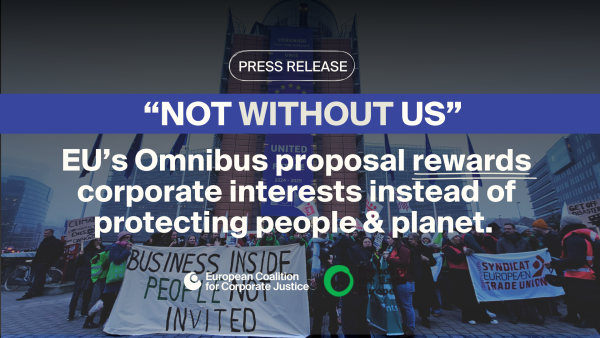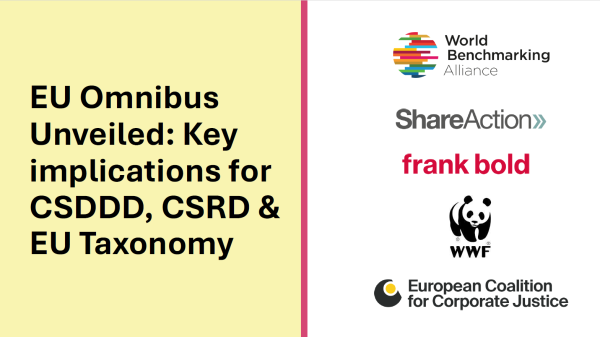This website uses cookies so that we can provide you with the best user experience possible. Cookie information is stored in your browser and performs functions such as recognising you when you return to our website and helping our team to understand which sections of the website you find most interesting and useful.

A coalition of eight NGOs lodged a formal complaint today with the European Ombudsman, condemning the undemocratic, untransparent and rushed way in which the European Commission has developed the Omnibus proposal.
The Omnibus proposal seeks to significantly water down key EU sustainability laws that were recently adopted, including the Corporate Sustainability Reporting Directive (CSRD) the Corporate Sustainability Due Diligence Directive (CSDDD) and the EU Taxonomy Regulation.
NGOs deplore that the process leading to this proposal was deeply flawed, enabling a small group of industry interests to take control and push for the deregulation of key sustainability laws.
What we have to say
European Coalition for Corporate Justice, ClientEarth, Notre Affaire À Tous, Clean Clothes Campaign, Global Witness, T&E, Anti-Slavery International, and Friends of the Earth Europe said:
“We are contesting the Commission’s rushed dismantling of three key pillars of the Green Deal – including laws meant to improve the environmental and human impacts of global trade – a process that completely disregards people and nature’s rights.
“The Omnibus proposal was made without any public consultation, sidelining civil society, with a lack of evidence or environmental and social impact assessments, and with a primary focus on narrow industry interests. This reckless move not only weakens sustainability rules but also damages public trust in the EU’s democratic foundations.”
More specifically, the NGOs accuse the Commission of:
- Failing to properly gather evidence and assess the environmental and social impacts of amending corporate laws designed to protect citizens in the EU and beyond;
- Sidestepping broad consultations to favour closed-door meetings dominated by oil and gas industry interests (the content of which were revealed only through press leaks)
- Failing to assess whether its proposal aligns with the EU’s climate-neutrality target – in breach of its obligations under the European Climate Law;
Besides being at odds with the EU’s core democratic values and environmental goals, NGOs warn that the ‘Omnibus’ could also undermine the EU’s economic stability and the competitiveness objectives it is supposed to help.
The coalition added:
“This so-called simplification does nothing to enhance competitiveness; the European Commission is ignoring both evidence and science.”
“Strong sustainability laws like the CSDDD and CSRD are key to the EU’s competitive advantage in a global market where consumers and investors increasingly demand responsible corporate action. We have seen time and time again that vague corporate promises aren’t driving the change we need. Weakening environmental and human rights requirements is a step in the wrong direction.”
NGOs are calling on the European Parliament and Council to reject the Omnibus proposal. As a matter of urgency, ECCJ urges the Council of the EU and the European Parliament to ensure that in the upcoming legislative negotiations, the Omnibus proposal is revised to ensure that any amendments seeking to weaken the CSDDD are rejected. Any discussion of the CSDDD should be strictly limited to interpretative measures such as guidance and delegated acts and the text of the law itself should not be subject to any revisions. Regarding the CSRD, the European Parliament and Council should lower the thresholds of in-scope companies and give mid-sized companies a proportionate standard. The limitations on data requests should be reworked.
Notes to editors
- Over the past months, NGOs, Trade Unions and businesses have actively opposed the European Commission’s “Omnibus” proposal. Several companies have urged the commission to keep the current rules in place. The companies described investment and competitiveness as “founded on policy certainty and legal predictability.” In February 2025, ClientEarth lawyers criticised the proposal for significantly weakening corporate responsibility by limiting due diligence to direct business partners and diluting climate transition plan obligations. The proposal equally drew criticism for weakening corporate action addressing modern slavery in global supply chains. In response to the Omnibus proposal, more than 362 civil society organisations sent a joint statement urging the European Parliament and Council to reject the proposed amendments, emphasizing that they erode corporate accountability commitments and diminish human rights and environmental protections. Despite these concerns, the Commission proceeded with the proposal, which is now under consideration by the European Parliament and the Council. In March the Council agreed on the proposal to delay the implementation of the CSDDD, and on April 3, 2025, the European Parliament followed suit, granting lawmakers additional time to renegotiate the instrument.
- Last year, ClientEarth also filed two other complaints against the EU Commission’s undemocratic processes to the EU Ombudsman: Commission’s “anti-democratic” CAP revision escalated to EU Ombudsman and Ombudsman opens inquiry after EU trashes wolf protections.












